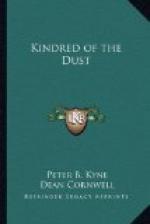“I’m going to make a real start to-morrow morning, mother,” he announced brightly. “I’m going up in the woods and be a lumberjack for a month. Going to grow warts on my hands and chew tobacco and develop into a brawny roughneck.”
“Is that quite necessary?” Elizabeth queried, with a slight elevation of her eyebrows. “I understood you were going to manage the business.”
“I am—after I’ve learned it thoroughly, Lizzie.”
“Don’t call me ‘Lizzie,’” she warned him irritably.
“Very well, Elizabeth.”
“In simple justice to those people from Darrow that you evicted from the Sawdust Pile, Don, you should finish your work before you go. If they were not fit to inhabit the Sawdust Pile, then neither is Nan Brent. You’ve got to play fair.” Jane had returned to the attack.
“Look here, Jane,” her brother answered seriously: “I wish you’d forget Nan Brent. She’s an old and very dear friend of mine, and I do not like to hear my friends slandered.”
“Oh, indeed!” Jane considered this humorous, and indulged herself in a cynical laugh.
“Friend of his?” Elizabeth, who was regarded in her set as a wit, a reputation acquired by reason of the fact that she possessed a certain knack for adapting slang humorously (for there was no originality to her alleged wit), now bent her head and looked at her brother incredulously. “My word! That’s a rich dish.”
“Why, Donald dear,” his mother cried reproachfully, “surely you are jesting!”
“Not at all. Nan Brent isn’t a bad girl, even if she is the mother of a child born out of wedlock. She stays at home and minds her own business, and lets others mind theirs.”
“Donald’s going to be tragic. See if he isn’t,” Elizabeth declared. “Come now, old dear; if Nan Brent isn’t a bad woman, just what is your idea of what constitutes badness in a woman? It would be interesting to know your point of view.”
“Nan Brent was young, unsophisticated, poor, and trusting when she met this fellow, whoever he may be. He wooed her, and she loved him—or thought she did, which amounts to the same thing until one discovers the difference between thinking and feeling. At first, she thought she was married to him. Later, she discovered she was not—and then it was too late.”
“It wouldn’t have been too late with some—er—good people,” The Laird remarked meaningly.
“In other words,” Donald went on, “Nan Brent found herself out on the end of a limb, and then the world proceeded to saw off the limb. It is true that she is the mother of an illegitimate child, but if that child was not—at least in so far as its mother is concerned—conceived in sin, I say it isn’t illegitimate, and that its mother is not a bad woman.”
“Granted—if it’s true; but how do you know it to be true?” Jane demanded. She had a feeling that she was about to get the better of her brother in this argument.




